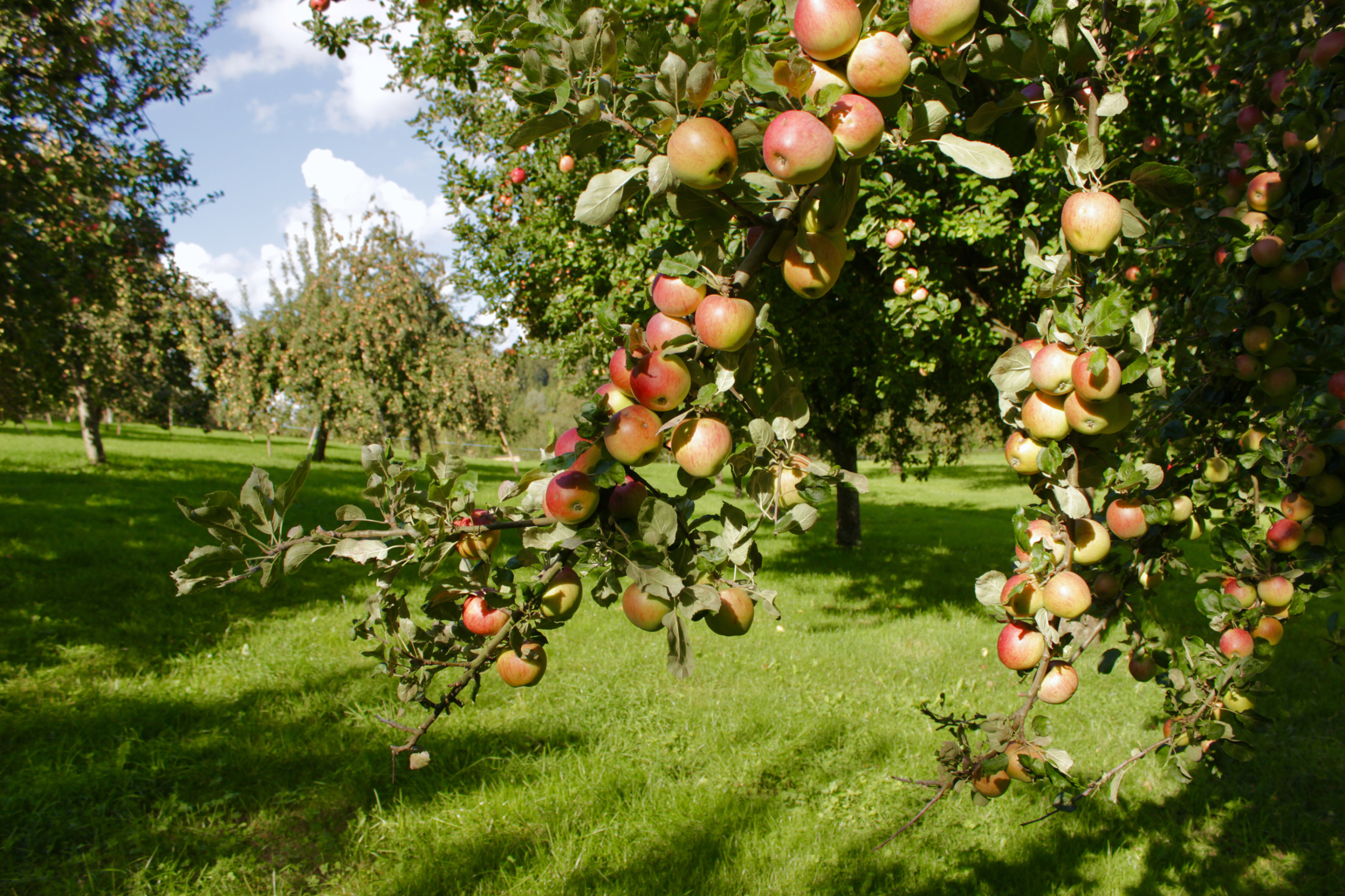Cosmetic pesticides are making it to your apple. Is that a bad thing?

Plant growth hormones are widely used in fruit cultivation to give consumers uniform, blemish-free products. But with little published research into their impact on human health, the risks are as yet unknown.
Apples occupy an important place in Swiss hearts and shopping baskets – they are the country’s most popular fruit, and on average consumers munch through just over 100 apples a year, according to the Swiss Fruit Union (SFU), a lobby group for the country’s fruit farmers.
Unknown to many apple lovers, however, is that their favourite fruit is probably sprayed with potentially harmful plant growth hormones to enhance its size and colour. Some 300 kilos of the chemicals, also known as cosmetic pesticides, are sprayed every year in Swiss apple orchards, enough to treat 83% of all land used to grow the fruit. The hormones are also used to manage a tree’s crop, a process known as chemical thinning, reducing yield which in turn increases the size of the remaining fruit at harvest.
“In a supermarket, how an apple looks is the decisive factor [in purchasing decisions],” says Lucca Zachmann, a researcher at the federal technology institute ETH Zurich. “Price, variety, production method and origin may also affect choice, but there is not much else a consumer can use to make their decision.”
Unknown risks
While the effects of conventional pesticides on human health have been well studied, the use of plant growth regulators has expanded under the radar and little research has been carried out on their impact.
A review of the scientific literatureExternal link indicates that some growth regulators are endocrine disruptors and can adversely affect the production of sex hormones and endanger reproductive health. They have also been detected in food and human urineExternal link, raising concerns about the impact exposure could have on agricultural workers and consumers.
Switzerland’s Federal Food Safety and Veterinary Office told SWI swissinfo.ch in an email that “authorised plant protection products, including plant regulators, should not have harmful effects on human health when used correctly (i.e. in accordance with the conditions and restrictions of use stipulated in the corresponding authorisation)”.
In Switzerland, as in the European Union, plant growth regulators are classified as pesticides for the purposes of regulatory approval and requirements on labelling and maximum allowed residue. And like pesticides, these hormones are a potential threat to human health.
The World Health Organization’s globally harmonised system to classify chemicals lists 25 plant growth regulators that present a risk based on doses lethal to rats, a standard measure of toxicity. None of the plant growth regulators listed falls in the extremely or highly hazardous categories, but eight are classified as moderately hazardous (the third most risky category of five). Of these eight, four are authorised in Switzerland (Chlormequat chloride, Mepiquat, Napthyloxyacetic acid and Paclobutrazol) compared with only two in the EU (Paclobutrazol and Mepiquat).
Swiss environmental NGO Pro Natura has not campaigned against plant growth regulators specifically but acknowledges they are part of the problem of pollutants released into the environment and that they must be reduced.
“Reducing the spread of chemical substances in the environment and in our bodies is an absolute necessity. In this sense, accustoming consumers to fruit and vegetables that are increasingly ‘perfect’ visually is counter-productive,” says spokesperson Nicolas Wüthrich.
Foodwatch, a pan-European NGO, is campaigning for a complete phase-out for pesticides in the European Union, including growth regulators, by 2035. It wants the process to start with crops such as cereals and maize where pesticide use is most widespread and elimination is the easiest and cheapest. Fruits are also on the radar but it may take longer.
“Farmers cultivating grapes and apples may require an extended transition period due to the unique challenges posed by specific pests or diseases associated with these crops,” says spokesperson Sarah Häuser. “Nevertheless, even these agricultural products can progressively shift towards pesticide-free production, especially when indications only serve cosmetic purposes.”

More
Pesticide-free but not organic: Swiss offer alternative to wean agriculture off chemicals
Money talks
Zachmann published a study in May on the use of plant growth hormones to improve the visual appearance of apples produced in Switzerland. A survey carried out as part of his research attracted responses from some 200 growers, representing a quarter of the country’s total land under apple cultivation. It showed that 23.5% mainly use cosmetic pesticides to enhance fruit appearance while 59.2% use them for chemical thinning.
The survey also found that the use of plant growth regulators is not uniform. Swiss farmers who sold their produce to intermediaries were more likely to spray such chemicals than those who sold directly to consumers. The former were 29.6% more likely than the latter to use plant growth regulators for visual purposes and 23.9% more likely to employ chemical thinning to enhance apple size and colour. The main reason for this difference is money.
“Farmers who sell apples through intermediaries face greater economic loss if their apples fail to make the top grade,” says Zachmann. He calculates that for farmers who sell to intermediaries, Class 2 apples, which allow for slight blemishes or defects, command only 41% of the price of Class 1 apples, which must meet strict appearance criteria. In comparison, for growers who sell directly to consumers, Class 2 apples can achieve 67% of the price of Class 1 apples.
So who is to blame for making unnaturally perfect apples more profitable, pressuring farmers to use growth hormones?
Migros, Switzerland’s largest supermarket chain, says it does not set guidelines for fruit prices based on their appearance. “Migros always uses the target prices set by the various agricultural sectors to determine the prices it pays to producers,” says spokesperson Tristan Cerf.
Standards in the fruit sector are set by the SFU and the Swiss Association for Trade in Fruit, Vegetables, and Potatoes (SWISSCOFEL). SFU guidelines categorise table apples into three classes (Extra Class, Class 1 and Class 2) that are based purely on appearance. Those that make it to Extra Class are not allowed any physical defects with the exception of very slight superficial skin blemishes, provided these do not affect the general appearance of the produce. Class 1 apples are allowed to have slight defects but skin defects cannot exceed an area of 1cm2, while Class 2 apples are permitted a more generous 2.5 cm2 but still have to meet certain minimum standards.
Crippling blow
Despite these very specific appearance requirements, the SFU denies that its guidelines encourage farmers to spray for beauty. According to its vice president, Edi Holliger, the aim of using plant growth hormones is to ensure that unsold apples are of good enough quality to be stored and sold later.

More
‘Intensely aromatic’ apple named Swiss Fruit of the Year
“Both internal and external quality must be good if the farming business is to be profitable and sustainable,” he says. “A very subtle approach is necessary here to ensure that the yield doesn’t fluctuate too much – one year with far too few fruits on the tree and therefore fruits that cannot be stored and are too large, and the next year far too many fruits on the tree that would be far too small without intervention.”
A ban on plant growth hormones or regulations requiring a significant reduction in their use could cripple fruit farmers financially, he says.
“Without measures taken by the producers, the profitability of the farms would very quickly become negative and production would no longer be sustainable. The risks would be unacceptably high,” he warns.
However, pressure is growing on the use of pesticides in Switzerland. In 2023 the government set itself a goal of reducing the harmful environmental effects of such chemicals by half by 2027. Pro Natura wants plant growth hormones to be included in this target.
“In the absence of sufficient studies, the precautionary principle should apply,” says Wüthrich. “As far as products already in use are concerned, we support the conclusion of [Zachmann’s] study recommending a reduction in their use. These products should be included in the pesticide reduction plan.”
Edited by Nerys Avery/ts

In compliance with the JTI standards
More: SWI swissinfo.ch certified by the Journalism Trust Initiative









You can find an overview of ongoing debates with our journalists here . Please join us!
If you want to start a conversation about a topic raised in this article or want to report factual errors, email us at english@swissinfo.ch.